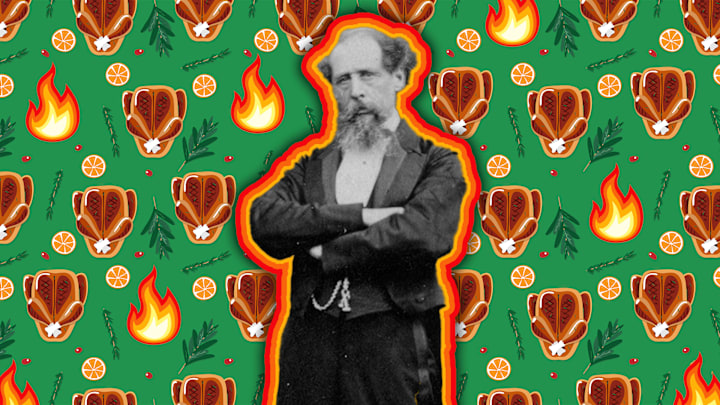On the afternoon of Christmas Eve 1869, George Dolby could be found relaxing at his family home in Ross-on-Wye, a small riverside town in Herefordshire, England. The cheerful atmosphere was suddenly interrupted by the delivery of a desperate message:
WHERE
IS
THAT
TURKEY?
IT
HAS
NOT
ARRIVED
! ! ! ! ! ! ! ! ! ! !
The sender—none other than Charles Dickens—would have an answer before the day was out. But would he have his Christmas turkey?
Festive Fowl
Dickens’s association with turkey, specifically as a Christmas dinner centerpiece, didn’t begin and end with Ebenezer Scrooge’s selfless gesture toward the Cratchit family in A Christmas Carol. The bird featured in some of his other Christmas stories, too, from The Seven Poor Travellers to A Christmas Dinner.
He was also known to enjoy chowing down on the fowl himself, often mentioning turkey in correspondence regarding Christmas plans. It wasn’t uncommon during the Victorian era to send a friend a turkey for the holidays, and Dickens’s publishers made it a habit of doing so each year.
“My Dear Sirs,” he wrote to them on January 2, 1840, “I determined not to thank you for the Turkey until it was quite gone, in order that you might have a becoming idea of its astonishing capabilities. The last remnant of that blessed bird made its appearance at breakfast yesterday—I repeat it, yesterday—the other portions having furnished forth seven grills, one boil and a cold lunch or two.”

So when George Dolby decided to gift the esteemed writer one of those blessed birds in 1869, it seemed like a good idea. Dolby, a jovial man in his late thirties, had been managing Dickens’s public readings for a few years; and during that time the two had grown close. The holiday season of 1869 had been particularly busy, with Dickens having just finished his final recitation in London on December 22. Though Dolby’s own family plans would prevent him from attending the Dickenses’ forthcoming Christmas festivities in Kent, he still wanted to be there in spirit—and providing the prize turkey would definitely do the trick.
The gravity of choosing a turkey to be served at the Christmas party of the guy who came up with A Christmas Carol wasn’t lost on Dolby.
“I caused immense pains to be taken for the production of the finest turkey the neighbourhood of Ross, or even the whole county of Hereford, could afford,” he wrote in his 1887 memoir, Charles Dickens As I Knew Him. After procuring a “magnificent bird” that tipped the scales at about 30 pounds, Dolby told Dickens to expect it by Christmas Eve.
So you can imagine the author’s consternation when December 24 arrived with no sign of a turkey.
The Smoking Car
Dickens’s melodramatic memo wasn’t the only one dispatched to Dolby that fateful afternoon. He also heard word that roughly a dozen other parcels he’d packed with foodstuffs had yet to reach their recipients.
En route to the local train station to investigate the matter, the baffled gifter happened to cross paths with the station-master, who’d been on his way to the Dolby household bearing bad news. The horse-box—a covered car large enough to transport horses or other cargo—carrying the holiday hampers had gone up in flames somewhere between Gloucester and Reading.

The cause of the blaze is a mystery to this day; according to Britain’s National Railway Museum, it’s possible that engine sparks ignited the car’s wooden frame when the train was in a tunnel. Whatever the case, Dolby didn’t concern himself too much with it—nor even with ensuring reimbursement for the goods, “for the value … was as nothing compared with my distress of mind at the thought of Mr. Dickens going without his turkey on Christmas Day,” he wrote. Dolby telegraphed his friend immediately to tell him to go find a replacement turkey posthaste.
Unfortunately, Dolby’s narrative prowess didn’t quite measure up to Dickens’s (whose does?), for his account fails to mention whether another bird was procured in time for Christmas dinner. What we do know is that Dickens’s indignation didn’t last. On February 5, 1870, he penned a pretty forgiving response to James Charles Kingett, the Great Western Railway superintendent who’d apologized after the incident:
“In reply to your letter I beg to say that I have no doubt my Christmas fare was destroyed by an unavoidable accident, and that I bore the loss with unbroken good humour towards the Great Western Railway Company.”

Dickens also apparently “[referred] to the matter frequently, and with gratitude,” per Dolby. Why? Because the railway company sold “the charred remains of turkeys and joints of beef” on the cheap to Reading’s poor residents.
The Oliver Twist author died in June 1870—meaning there’s a possibility his very last Christmas turkey helped nourish the socioeconomic class that inspired so many of his most memorable characters. Maybe if Great Western Railway’s reps had been visited by a few Yuletide ghosts, they’d have at least handed out the blackened meat for free.
